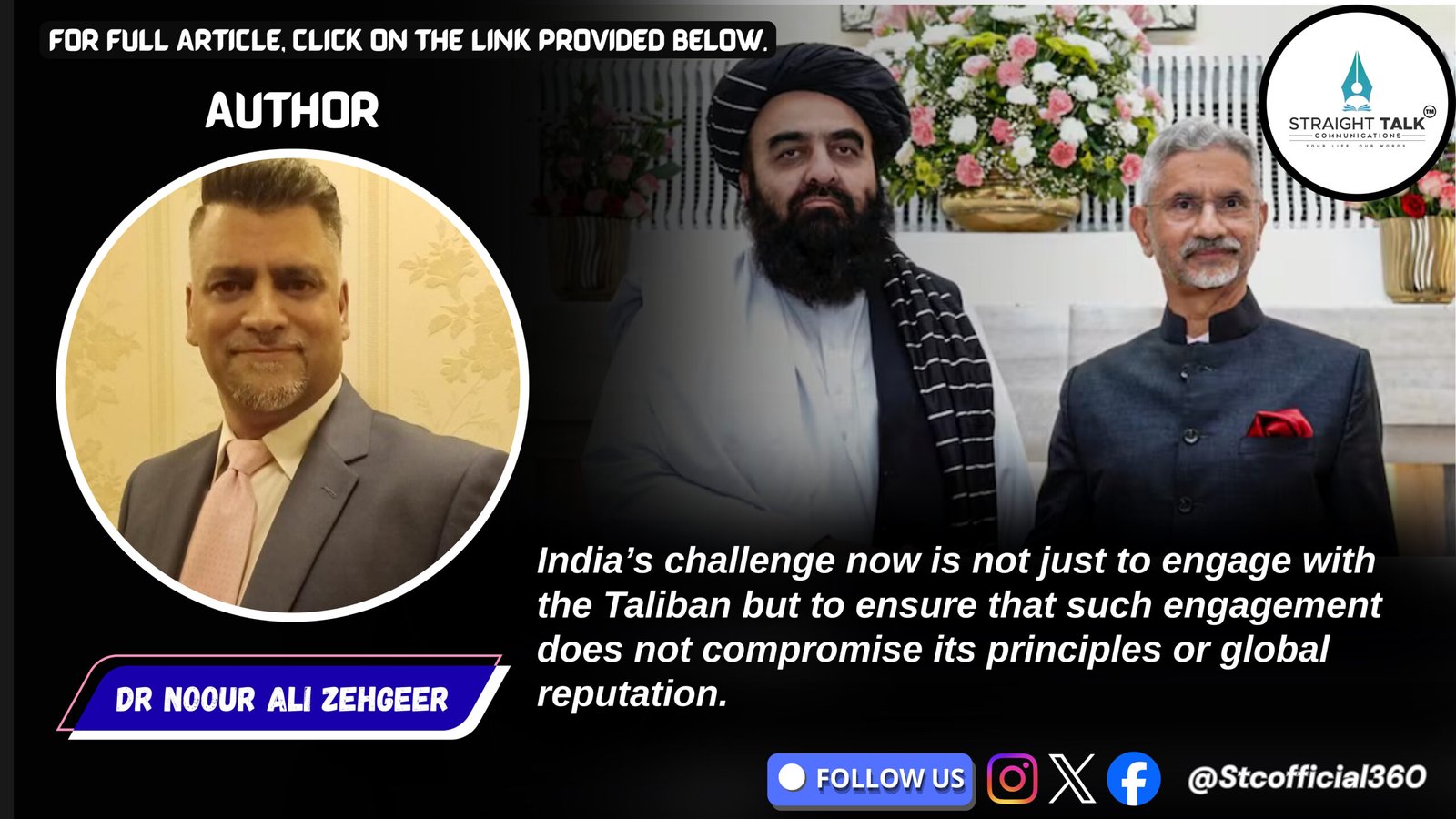India and the Taliban: Realpolitik or a Real Risk?

India’s challenge now is not just to engage with the Taliban but to ensure that such engagement does not compromise its principles or global reputation.
Dr Noour Ali Zehgeer
India’s recent engagement with the Taliban’s Foreign Minister — a UN-sanctioned individual — has stirred both curiosity and controversy in equal measures. For New Delhi, this outreach might seem like realpolitik — a pragmatic move dictated by shifting geopolitical currents in South and Central Asia. Yet for many observers, it raises a deeper, more uncomfortable question: Has India compromised its principles for the sake of strategic convenience?
The meeting, though perhaps inevitable in the new regional reality, has reopened a moral and diplomatic debate about how far India is willing to go to safeguard its interests — and at what cost.
A Breach of Trust?
For decades, Afghanistan and India shared a relationship built on trust, empathy, and shared history. India wasn’t just another regional player; it was a reliable partner, often referred to by Afghans as an elder brother — a nation that stood by them in times of conflict and instability. From building hospitals and roads to investing in education and governance, India’s development assistance made it a symbol of peace in a war-torn land.
Thus, this recent engagement with the Taliban — a regime that seized power through violence, suppresses women’s rights, and continues to shelter extremist elements — feels to many like a betrayal of that legacy. The people of Afghanistan, who have long admired India’s democratic values and secular ethos, now find themselves questioning whether the world’s largest democracy has begun to compromise with forces that embody everything it once opposed.
This meeting also appears to contradict India’s longstanding policy of zero tolerance for terrorism. How does a nation that refuses dialogue with terrorist organizations justify sitting across the table from a UN-sanctioned minister of a government still struggling for legitimacy?
It’s a fair question — one that cuts to the core of India’s foreign policy identity.
The Realpolitik Argument
Yet, from another angle, this engagement may not be betrayal but strategic necessity. The Taliban, whether the world likes it or not, currently represents the de facto government of Afghanistan. To ignore them would mean ceding influence in a region where China, Pakistan, Iran, and Russia are already manoeuvring aggressively for leverage.
Diplomacy, after all, is not about friendships; it’s about interests. India, guided by a “nation-first” principle, cannot afford to let ideology cloud its strategic vision. Engaging with the Taliban doesn’t mean endorsing their ideology — it means acknowledging political reality.
Moreover, this isn’t the first time India has spoken to adversaries. New Delhi has engaged Pakistan several times despite its long history of sponsoring terrorism. The difference here is that India is not recognizing the Taliban regime formally; it’s testing the waters, ensuring its interests — particularly in trade, connectivity, and counterterrorism — are not undermined by exclusion.
In the game of geopolitics, moral clarity often collides with strategic necessity. The Indian establishment knows that isolationism achieves little. A seat at the table, however uncomfortable, is often better than shouting from outside the room.
Who Really Gains?
Still, one must ask: Who benefits most from this meeting?
For the Taliban, this engagement is a diplomatic victory. It lends them a veneer of legitimacy they have been desperately seeking. Being received by one of the world’s major powers — especially one that has long championed democratic values — allows them to project an image of acceptance to the global community.
For Afghanistan’s neighbors like Pakistan and China, India’s move might come as both surprise and concern. New Delhi, by reopening communication lines, signals that it refuses to be cut out of regional equations. It’s a way of saying: India is still here, and still matters.
For India, however, the gains are less immediate. Yes, the meeting may open avenues for intelligence sharing, trade routes, or humanitarian assistance. It could help ensure that Afghan soil isn’t used for anti-India terror activities. But these are still ifs and maybes.
The real test will be whether such outreach translates into tangible outcomes — or whether it ends up as another well-intentioned diplomatic gesture that history quietly shelves away.
Principle vs. Pragmatism
At the heart of this issue lies a timeless dilemma: Should foreign policy be guided by moral conviction or national interest? India’s engagement with the Taliban isn’t about endorsement; it’s about influence. Yet, in trying to secure that influence, there’s a risk of eroding the very moral high ground that has defined India’s global image for decades. The line between engagement and legitimization is perilously thin — and one misstep could blur it beyond repair.
Still, one must also acknowledge that the geopolitical landscape has changed. The world is not divided into heroes and villains anymore. Power dynamics are fluid, alliances are temporary, and every country is recalibrating its approach to survive in a multipolar world.
India, therefore, must walk this tightrope — balancing ideals with interests, compassion with caution.
The Final Word
So, is India’s meeting with the Taliban a betrayal or a masterstroke? Perhaps it’s a bit of both.
It’s betrayal if seen through the lens of sentiment — of friendship, loyalty, and shared values with the Afghan people.
It’s strategy if viewed through the prism of national interest and regional survival.
The truth, as always, lies somewhere in between.
India’s challenge now is not just to engage with the Taliban but to ensure that such engagement does not compromise its principles or global reputation. The world is watching — and so are the Afghan people, who once looked to India not just for power, but for hope.
In diplomacy, as in life, sometimes the hardest part isn’t meeting your enemy — it’s not losing yourself in the process.
(Disclaimer: The views expressed in the articles posted on this site are exclusively of the authors and not that of Straight Talk Communications.)







